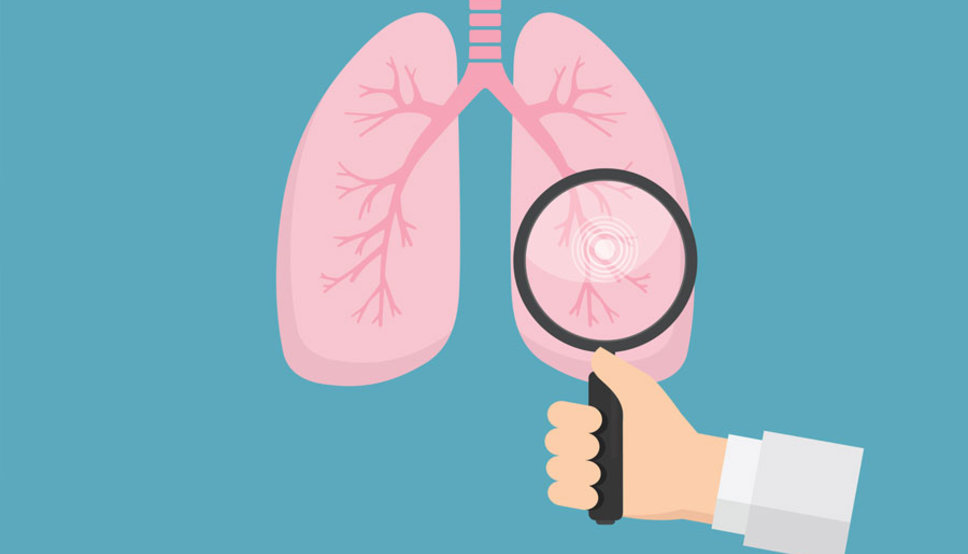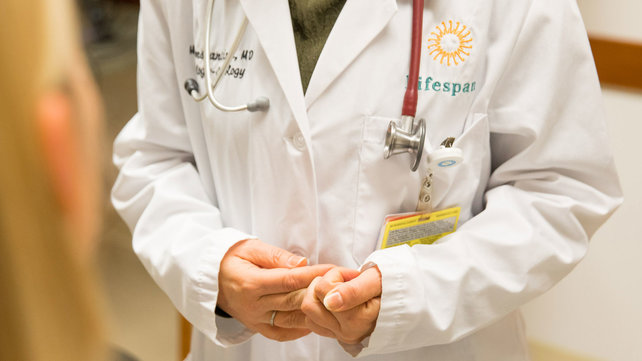When to Worry About Lung Nodules

If you’ve been told you have a lung nodule, the good news is that you really don’t need to worry too much. Lung nodules can occur for a variety of reasons and are generally benign. Very rarely, though, they are indicators of lung cancer.
What is a lung nodule?
A lung nodule is an abnormal growth that forms in a lung, usually surrounded by normal lung tissue. Are lung nodules related to lung cancer?
It is normal to worry if there’s a connection between lung nodules and lung cancer. After all, lung cancer is the leading cause of cancer death in both men and women, accounting for about 20 percent of all cancer deaths. Each year, more people die of lung cancer than the next three deadliest cancers combined. Early detection through lung cancer screenings is incredibly important and can lead to a 20 percent reduction in lung cancer death among high-risk patients.
On the other hand, most lung nodules are benign, not cancerous. In most cases, an infection or inflammation can cause a clump of cells to overgrow, forming a nodule. Other causes of a noncancerous nodule could include auto-immune conditions involving the lung, chronic lung infections, or environmental exposure to asbestos.
Rarely, in approximately five percent of cases, lung nodules are found to be cancerous. The remaining 95 percent are often current or past infectious lesions or sometimes an abnormal growth of cells.
How common are lung nodules? And what are the symptoms?
Lung nodules are very common. Up to half of adults who get scans of their chest can be found to have one or more lung nodules. Most lung nodules are small, and they do not usually cause any symptoms.
How are lung nodules diagnosed or detected?
Most people find out about lung nodules after a scan of the chest, often incidentally. However, a lung cancer screening test can detect a lung nodule in time to initiate an adequate work-up if the nodule is thought to be cancerous.
Can a CT scan tell if a lung nodule is cancerous?
In most cases, a CT scan alone cannot tell if a lung nodule is cancerous. Characteristics of the nodule on the CT scan (size, shape, location, and monitoring the growth over time) along with health risk factors help determine the probability of the nodule being cancerous. If a nodule is not growing, it’s unlikely to be a cancer. If the nodule is growing or appears suspicious, a biopsy is usually recommended. A biopsy involves taking a small sample from the nodule to examine under the microscope for evidence of cancer. Biopsies can be performed via different routes depending on the location of the nodule.
Should I get screened for lung nodules?
Yes, if you are in the high-risk group for lung cancer. This group includes:
- Those between the ages of 50 and 80 and who have at least 20 pack year history of smoking. A pack year history is the number of years smoked multiplied by the average number of packs smoked per day (two packs smoked per day x 10 years of smoking = 20 pack year history).
- Those who are current smokers or have quit in the past 15 years.
Cancer screenings are aimed to detect cancer before symptoms appear. This early detection provides the advantage of a less invasive and less toxic treatment, and higher likelihood of eradicating the cancer. Those eligible for lung cancer screening should get a CT scan every year.
Cancer screening is designed to keep you healthy. Lung cancer screening involves a low dose CT scan of the chest. It is just like a regular CT scan but uses a lower dose of radiation. The scan is usually less than five minutes, after which a computer software creates a 3D view of the lungs and organs. It gives us a better picture of your lungs than a chest x-ray.
Do I need to ask my doctor to get lung cancer screening?
Yes, you can ask your doctor to refer you for a lung cancer screening CT scan (LDCT) or you can refer yourself to our Lung Cancer Screening Clinic, where we will connect you with a provider who can discuss and order the lung cancer screening CT.
Most insurance carriers now cover the cost of this test. In the state of Rhode Island, all insurance carriers cover lung cancer screening. You may also check with your insurance company prior to your appointment to confirm if this test is covered.
Visit our website to learn about the symptoms of lung cancer. To schedule a screening or for more information about the Lung Cancer Screening Clinic, please call 844-401-5864 (LUNG).
Be Well Newsletter
Lung Cancer Screening Clinic

Early detection is critical to successful lung cancer treatment. Our lung cancer screening clinic provides low dose CT scans for at-risk individuals.
Find a Doctor

The right provider is in our network
Search more than 1,200 providers in our network.



